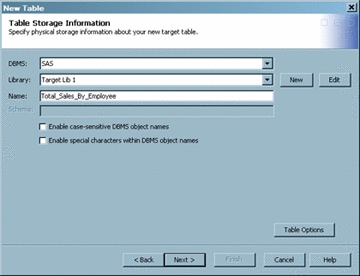Registering New Tables with the New Table Wizard
Solution
Tasks
Register a New Table with the New Table Wizard
-
Click Next to access the Table Storage Information page. Enter appropriate values in the following fields:
-
Name (must follow the rules for table names in the format that you select in the DBMS field. For example, if SAS is the selected DBMS, the name must follow the rules for SAS data sets. If you select another DBMS, the name must follow the rules for tables in that DBMS. For a SAS table or a table in a database management system, you can enable the use of mixed-case names or special characters in names.)
Use the Table Storage Information page to specify the format and location of the table that you are registering. You also specify the database management system that is used to create the target, the library where the target is to be stored, and a valid name for the target. You can specify new libraries or edit the metadata definitions of existing libraries by using the New and Edit buttons. You can use the Table Options button to specify options for SAS tables and tables in a DBMS. The following display shows these settings for a sample table.
